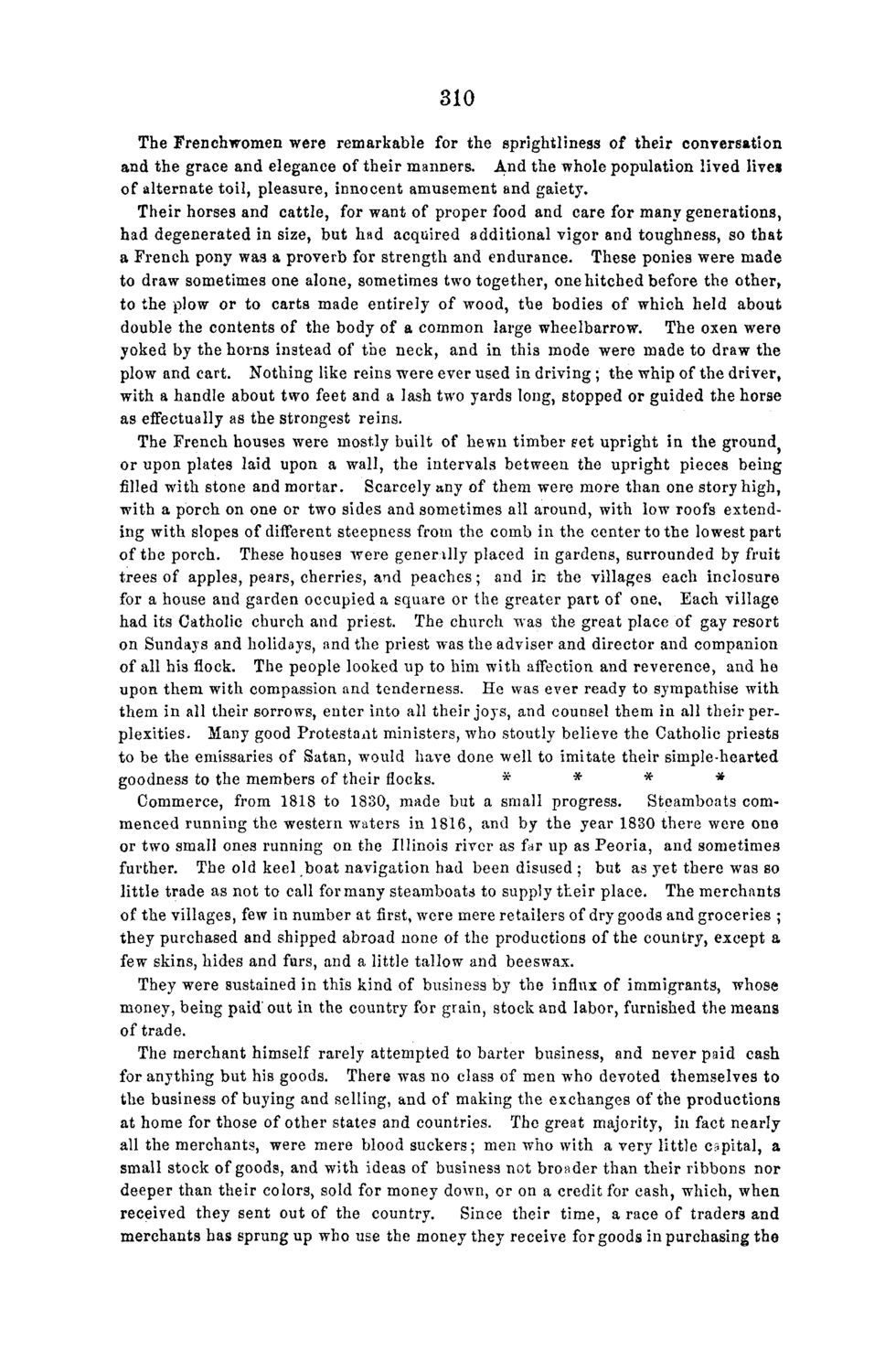| |
| |
Caption: Board of Trustees Minutes - 1868
This is a reduced-resolution page image for fast online browsing.

EXTRACTED TEXT FROM PAGE:
310 The Frenchwomen were remarkable for the sprightliness of their conversation and the grace and elegance of their manners. Ancl the whole population lived lives of alternate toil, pleasure, innocent amusement and gaiety. Their horses and cattle, for want of proper food and care for many generations, had degenerated in size, but had acquired additional vigor and toughness, so that a French pony was a proverb for strength and endurance. These ponies were made to draw sometimes one alone, sometimes two together, one hitched before the other, to the plow or to carts made entirely of wood, the bodies of which held about double the contents of the body of a common large wheelbarrow. The oxen were yoked by the horns instead of the neck, and in this mode were made to draw the plow and cart. Nothing like reins were ever used in driving ; the whip of the driver, with a handle about two feet and a lash two yards long, stopped or guided the horse as effectually as the strongest reins. The French houses were mostly built of hewn timber set upright in the ground^ or upon plates laid upon a wall, the intervals between the upright pieces being filled with stone and mortar. Scarcely any of them were more than one story high, with a porch on one or two sides and sometimes all around, with low roofs extending with slopes of different steepness from the comb in the center to the lowest part of the porch. These houses were generally placed in gardens, surrounded by fruit trees of apples, pears, cherries, and peaches; and ic the villages each inclosure for a house and garden occupied a square or the greater part of one, Each village had its Catholic church and priest. The church was the great place of gay resort on Sundays and holidays, and the priest was the adviser and director and companion of all his flock. The people looked up to him with affection and reverence, and he upon them with compassion and tenderness. He was ever ready to sympathise with them in all their sorrows, enter into all their joys, and counsel them in all their per. plexities. Many good Protestant ministers, who stoutly believe the Catholic priests to be the emissaries of Satan, would have done well to imitate their simple-hearted goodness to the members of their flocks. * * * * Commerce, from 1818 to 1830, made but a small progress. Steamboats commenced running the western waters in 1816, and by the year 1830 there were one or two small ones running on the Illinois river as far up as Peoria, and sometimes further. The old keel boat navigation had been disused ; but as yet there was so little trade as not to call for many steamboats to supply their place. The merchants of the villages, few in number at first, were mere retailers of dry goods and groceries ; they purchased and shipped abroad none of the productions of the country, except a few skins, hides and furs, and a little tallow and beeswax. They were sustained in this kind of business by the influx of immigrants, whose money, being paid out in the country for grain, stock and labor, furnished the means of trade. The merchant himself rarely attempted to barter business, and never paid cash for anything but his goods. There was no class of men who devoted themselves to the business of buying and selling, and of making the exchanges of the productions at home for those of other states and countries. The great majority, in fact nearly all the merchants, were mere blood suckers; men who with a very little capital, a small stock of goods, and with ideas of business not broader than their ribbons nor deeper than their colors, sold for money doAvn, or on a credit for cash, which, when received they sent out of the country. Since their time, a race of traders and merchants has sprung up who use the money they receive for goods in purchasing the
| |